Books
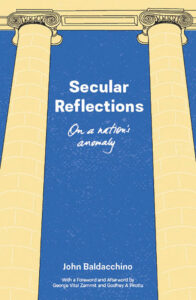
Secular Reflections: On a nation’s anomaly
John Baldacchino contends that Maltese politics must come to terms with what he regards as an anomalous state, a predicament in which Malta’s relatively young republic finds itself. He invites his readers to consider whether Maltese society could ever take on the challenge of secularizing the horizon on which it must operate, and where Malta’s polity is recognised in all its diverse needs, unpredictable traits, and contrasting ambitions, especially as it comes to terms with sixty years of independence.
Taking account of the post-colonial condition that continues to shape Malta, Baldacchino references a wider horizon that includes reflections on British, European, and American politics, particularly read from Scotland and New York where this volume was written. Taking advantage of the perspective that this geographical distance gives him, he reinforces the argument that for Malta’s political anomaly to be surpassed, society needs to find a way out of the confessional impasse where the Maltese seem to refuse to even agree on stating the same principles of fairness and decency which, if they care to look closer, they ultimately hold in common.
It is from this laic perspective that this book presents and discusses the cruelty of the quietist turn which sleepwalked Maltese politics into the abyss. Malta’s somnambulant quietism is anomalous because it is a nightmarish disorder where politicians have rejected the agonism on which democracy would normally work. Abandoning democracy’s objectives, the Maltese political anomaly reinforced several entrenched positions which in their obstinate tribal nature created the optimum condition for neoliberalism’s distortion of political struggle. In this fallacy of struggle, democracy becomes an asymptote whose curves represent a tension stuck in a never-ending sense of anguish, with opposed camps strained against each other without any hope of settlement. On top of the tribal maladies which festered with the assassination of journalist Daphne Caruana Galizia in 2017, this sense of frustration ushered in the sobering realization that this impasse is lost on Malta’s political class which seldom shows any interest in
finding a lasting solution beyond the walls of partisan affiliation. This pathetic predicament was sealed once more in the 2022 general election.
“Just as Orwell’s “historical impulse” reflects a desire to understand and communicate the reality of situations and events by presenting a factual and undistorted understanding of history and reality, Baldacchino discerns the anomaly of the Maltese reality, one which leads him to self-doubt and introspection, but one which enables us to read into our societal critique. In this perspective he weaves into the Maltese tapestry of norms and contradictions, morals, and vicissitudes. He spares no punches when needed, makes references regularly, and brings his arguments to life effortlessly. The reader should find this relatable and enjoyable, as much as it should be self-critical and enlightening. … This remarkable book is a must-read.”
George Vital Zammit, Policy, Politics and Governance, University of Malta
“Although he refutes labels, Baldacchino declares himself a radical democrat seeking to “giving a voice and a reality to those left behind.” This is the vision that underpins his reflections and to defend his thesis he turns to philosophers like Dewey, Illich and others. It is why he frequently reflects on the inequalities in our society caused in his view by confessionalism, colonial residue and tribal politics. Hence, to understand these reflections one has to keep all this in mind. Yet his vision of society cannot free him from being labelled, at best utopian at worst an extreme left-winger. The utopian label confers no shame: to be utopian is to be the conscience of a society. If the idea of rights is stronger today it is due to utopians and people on the left and no one else. The alternative is a society dominated by privilege and unchecked power.”
Godfrey A Pirotta, Professor of Government and Politics, University of Malta
Published by Midsea Books, 2024. Cover design by Claudia Baldacchino.
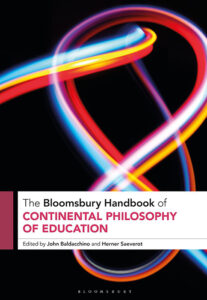
The Bloomsbury Handbook of Continental Philosophy of Education
This handbook is the first reference work to explore and define what continental philosophy of education is or could be, and what its boundaries are, serving as a point of entry for those who need an overview of the ideas in the field. The book includes 34 chapters written by leading scholars based in Belgium, Canada, China, Croatia, Cyprus, Denmark, Finland, Germany, Hong Kong, Iceland, Ireland, Israel, Lithuania, the Netherlands, Norway, New Zealand, Sweden, Taiwan, the UK and the USA. It is subdivided into three sections covering the metaphysics, ethics and aesthetics of education and the chapters focus on philosophical concepts such as otherness, empathy and personhood and problems including political influences on education and the limits of education. The contributors discuss a range of continental thinkers and look at how their work has influenced the wider field of philosophy of education.
“A stunning and stimulating array of topics from authors around the world. The editors took on a monumental task, and one very much needed: essays in continental rather than strictly Anglo-American philosophy of education. I will use this volume in my teaching and research with graduate students.”
AG Rud, Distinguished Professor, Washington State University, USA
“The phrase continental philosophy is often used to unify what is a rich and varied field of philosophical. Baldacchino and Saeverot’s Handbook provide an intellectually sensitive and nuanced collection of the multiplicity of “dialects” that form its family of resemblance in education. The collection of chapters problematizes the multiplicity of thought and recognizes the intersections with other fields of studies to open territories in the intellectual play of theory, philosophy, and pedagogy. Icons of Anglo-American philosophy as the pragmatism of John Dewey are re-spatialized to give greater depth in enunciating a field of thought that travels across geographical places. The Handbook probes of the disciplinary distinctions of metaphysics, ethics, and aesthetics expands their understanding beyond those surrounded by the analytical traditions in Anglo-American philosophy. The question of the Handbook is not only the fashioning of continental philosophy but also the question of philosophy itself.”
Thomas S. Popkewitz, Professor in the Department of Curriculum and Instruction, University of Wisconsin-Madison, USA
“The Handbook of Continental Philosophy of Education, edited by John Baldacchino and Herner Saeverot, is a monumental undertaking of scholarship and intellectual bravery. This volume explores all the key issues of our time and blazes new trails. After reading its chapters, one views the philosophy of education with new eyes.”
Stefano Oliverio, Associate Professor of Educational Theory, University of Naples, Italy
“This collection is a welcomed resource for students and scholars working with or interested in educational thought that has emerged, been fashioned, or synthetized in continental Europe. It invites readers to the sometimes untranslatable and incongruous in-between terrains of educational philosophy, which in itself can be considered a pedagogical act – that is, an encouragement to let go of the seeming transparency of terms and concepts and find educational thought anew.”
Juuso Tervo, Assistant Professor of Arts-Based Research and Pedagogy, Aalto University, Finland
Edited with Herner Saeverot. Published by Bloomsbury, 2024.
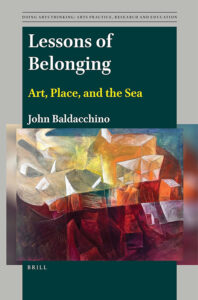
Lessons of Belonging: Art, Place and the Sea
Prompting this book is the paradox of belonging. What pushes the author to write are art’s questions. Rather than take the route of writing, artists in academia could opt for the studio, teaching students, and occasionally indulge in conferences and symposia. However, beyond such rituals, writing art’s questions remains akin to art’s acts of belonging. In these lessons of belonging this is done through art’s paradox. Belonging is a matter of art because art belongs to the aporia that writes it.
“This book is a journey in the process of finding what it means to belong. Not to belong somewhere, but rather to a nowhere that is called art, as everydayness. As in previous works, John Baldacchino’s artistic and philosophical writing challenges the readers to exit into the world. This exit is profoundly implied with today’s politics but also with history and ways of unlearning and imagining other futures for the arts and education. Lessons of Belonging opens up a space for critique and other possibilities of action beyond the borders of disciplines and spaces.”
Cat Martins, University of Porto
“John Baldacchino has gifted us a text which is something to write home about. The profundity and scholarship of his thoughts, coupled with the expanding horizons of his and other artist’s visual work ‘show’ us that belonging is always constituent, a force to originate or to instaur beyond established boundaries. In this sense belonging is antonymic. It is through the antinomies or paradoxes of art practice, its haecceity, but also its open horizons, its modes of insurrection and constitution, that Baldacchino approaches belonging in its multiplicity of dimensions as always becoming or individuating; opening up and re-newing cosmicities of belonging which do not invoke ontogenesis but a proliferating heterogenesis. The lessons we might learn from encounters with such heterogenesis— initiated in this text through art’s exit (its integral paradox)—in domains such as education or pedagogic work relate to its paganism, its contingencies and its everydayness, and how this might introduce us to the potential of a “people” or a belonging yet to arrive beyond the established parameters of practice.”
Dennis Atkinson, Goldsmiths University of London
“John Baldacchino’s latest work returns to familiar themes in his writings: the Mediterranean, longing, and art’s connection with the makings of possible pasts and futures. Baldacchino uses his intricate and thought-provoking writing to take readers on a journey in which art-making challenges us to grasp what we take for granted as the meaning of belonging. The book is full of beautiful images, which Baldacchino weaves together with erudition and clarity, introducing his readers to nostalgia as a heuristic for art-making processes challenging us to live more presently with and in the world.”
Sandro Barros, Michigan State University
Published by Brill, 2023.
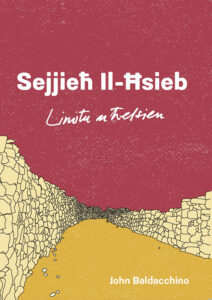
Sejjieħ il-Ħsieb: Limitu u Ħelsien
Dan il-ktieb jiftaħ spazju ġdid għal dawk li għandhom għal qalbhom il-filosofija bil-Malti; ktieb li jistiednek timraħ u tiddjaloga ma’ kunċetti ewlenin taletika, politika, letteratura, u epistemoloġija… Baldacchino juri kif firrelazzjonijiet eżistenzjali tagħna u fid-djalogu magħna stess u ma’ oħrajn titwieled il-filosofija.
Rubbleworks of Thought: Limit and Liberty
This books opens a new space for those who have Maltese philosophy in their hearts; a book that invites you to explore and dialogue with the main concepts of ethics, politics, literature, and epistemology… Baldacchino shows how philosophy is born in our existential relationships and in the dialogue with ourselves and with others.
“Il-Professur Baldacchino jaghtina ktieb filosofiku li jizvilppa hsieb uniku u originali, u mhux ktieb dwar l-istorja tal-filosofija. Dan il-ktieb jiftah spazju gdid ghal dawk li ghandhom ghall-qalbhom il-filosofija bil-Malti; ktieb li jistiednek timrah u tiddjaloga ma’ kuncetti ewlenin tal-etika, pulitka, letteratura, u epistemologija… . Baldacchino juri kif fir-relazzjonijiet ezistenzjali taghna u fid-djalgu maghna stess u ma’ ohrajn titwieled il-filosofija.”
“Professor Baldacchino regales us with a philosophical work which develops unique and original thought, where rather than a book on the history of philosophy he gives us a book of philosophy. This book opens new horizons to those who care for philosophy written in the Maltese language; a book that invites readers to roam and dialogue with major concepts in ethics, politics, literaure and epistemology … Baldacchino shows how philosophy is borne out of our existential relationships, in dialogue with ourselves and with others.”
John P. Portelli, Professor, University of Toronto
Published by Midsea Books, 2020. Cover design by Claudia Baldacchino.
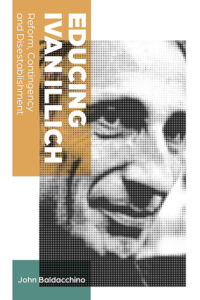
Educing Ivan Illich: Reform, Contingency and Disestablishment
More than a book about Illich, this is a conversation with Illich’s work as we enter the third decade of the 21st century, just under twenty years after his passing, and almost fifty years since his Deschooling Society was first published. As Illich is beatified and demonised in equal measure, Educing Ivan Illich chooses to focus on the relationship between reform, contingency and disestablishment. As reform stands for a plurality of reiterations that seek effective forms of accordance, in our recognition of contingency we freely claim that even as we might recognize the presence of universality in how everything appears on a shared horizon, we are not denied the existence and dynamic reality of plural possibilities in their inherent contradictions. In this bargain of synchronicity, we find that disestablishing the reified universe by which we have, for so long, traded, staked and even lost our freedom and intelligence, is not just a desire but it becomes a must. Unlike other commentators of Illich’s work, Baldacchino argues that what is radical about Illich is not a freestanding concept of deschooling but in how, in disestablishing social life, he exits the walls of the polis by upholding tradition as a disruptive force. In such light Illich’s work is read in what remains overdue. Odd though it may sound, this is an urgent need for anyone interested in Illich’s unique and irreplaceable contribution. To that end, Educing Ivan Illich has far more to offer than is usually expected from a commentary on someone else’s work.
“Reading Illich’s work by relating the disestablishment of institutions to re-form and contingency, thereby implying radical freedom, this book situates Illich’s thought in a ‘Golgotha’ that is found outside the polis, the church and the market. It wonderfully shows the relevance of Illich’s topicality of conviviality and the relevance of the attention he pays to the quality of hiddenness and of the way Illich contests widespread concepts like ‘life’ and ‘responsibility’. In this way Educing Ivan Illich offers a really refreshing and fascinating entry into Illich’s thinking.”
Jan Masschelein, Professor, Katholieke Universiteit Leuven
“In this magnificent book, John Baldacchino has imaginatively returned Ivan Illich to the intellectual ground of his life and ideas. Not only does Baldacchino present a rich philosophical reading of Illich, that goes beyond the decontextualized or anecdotal treatments that plague Illich’s legacy, Baldacchino also manages to theorize a constructive relation to tradition in a sympathetic and radical way.”
Samuel D. Rocha, Associate Professor, Department of Educational Studies, University of British Columbia
“Another outstanding monograph by John Baldacchino. A fresh, thorough and truly comprehensive work on Ivan Illich, an interdisciplinary theorist who is particularly relevant to our age given the massive problems we face with politicians and institutions. Baldacchino insightfully explains and justifies the theological foundation of Illich’s work, a foundation that strongly defines Illich’s crucial understanding of dissent and conviviality.”
John P. Portelli, Professor, OISE, University of Toronto
“In this scholarly reading of Ivan Illich, John Baldacchino conducts an astonishing feat; namely, to find ignored and minimized connections in Illich’s contribution to education. Educing Ivan Illich creates a new educational ‘language,’ with original viewpoints and perspectives, which expands our repertoire of thinking and our competence of acting—that we so desperately need when faced with educational situations. This volume should be read by anyone who has an interest not only in education but also in that which is good for humanity.”
Herner Saeverot, Professor of Education, Western Norway University
Published by Peter Lang, 2020. Cover design by Claudia Baldacchino.
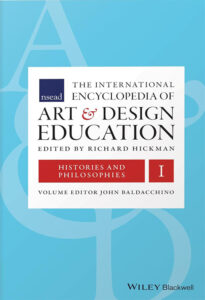
International Encyclopaedia of Art & Design Education. Volume 1: Histories and Philosophies
Written in conjunction with The National Society for Education in Art and Design, the International Encyclopedia of Art and Design Education offers an indispensable resource for students, scholars, and researchers working in the field of art and design education. It contains accessible introductions to key topics, concepts, and thinkers, as well as sophisticated debates on contentious areas, covering the whole age range from early years to post-university in formal and informal settings.
Editor. Published by Wiley-Blackwell, 2019.
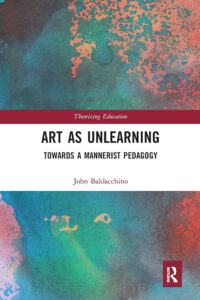
Art as unlearning: Towards a mannerist pedagogy
Art as Unlearning makes an argument for art’s unlearning as a manneristpedagogy. Art’s pedagogy facilitates a form of forgetfulness by extending what happens in the practice of the arts in their visual, auditory and performative forms. The concept of learning has become predominantly hijacked by foundational paradigms such as developmental narratives whose positivistic approach has limited the field of education to a narrow practice within the social sciences. This book moves away from these strictures by showing how the arts confirm that unlearning is not contingent on learning, but rather anticipates and avoids it.
This book cites the experience and work of artists who, by unlearning the canon, have opened a diversity of possibilities by which we make and live the world. Moving beyond clichés of art’s teachability and what we have to learn through the arts, it advances a scenario where unlearning is uniquely presented to us by the diverse practices that we identify with the arts. The very notion of art as unlearning stems from and represents a fundamental critique of the constructivist pedagogies that have dominated arts education for over half a century.
“In this provocative collection of writings, John Baldacchino articulates his concept of unlearning in relation to art and education. A mannerist pedagogy is advocated and unfolded as each chapter explores the relationships between art, philosophy and learning, engaging the reader into processes wherein art becomes a form of unlearning and learning becomes a form of art. Artists, art teachers, and teachers alike will find this a rewarding read.”
jan jagodzinski, Professor Visual Art and Media Education, University of Alberta, author of What is Art Education? After Deleuze and Guattari.
“Baldacchino makes an insightful and compelling case for unlearning and willed forgetfulness as creative dispositions through which the events of art and its education resist and endure foundational assumptions and representations of learning. Contrary to the linearity of developmental and constructivist modes, unlearning problematizes teleological objectives of knowledge acquisition and instead embraces the contingencies and immanent potentialities of paradoxical thought. His positioning unlearning alongside 16th and 17th century European Mannerist art and culture does not repeat and romanticize the past, but provides an historical association when canonical thought was once challenged, destabilized, and opened to the differential possibilities of life.”
Charles R. Garoian, Professor Emeritus of Art Education, Pennsylvania State University
Published by Routledge, 2018.
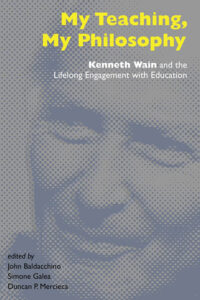
My Teaching, My Philosophy: Kenneth Wain and the Lifelong Engagement with Education
My Teaching, My Philosophy brings together twenty of the most prominent thinkers on education, philosophy, art, and literature to converse with Kenneth Wain and the many facets of his work. It shows how Wain’s passionate engagement with various issues, most prominently philosophy and education, continues to re-generate new ideas and thoughts through his philosophical method. This book gives Wain’s philosophy the attention it deserves and succeeds in continuing an open-ended philosophical conversation with its readers. My Teaching, My Philosophy is a must-read for anyone wanting to get a snapshot on the most recent thinking on philosophy of education.
Edited with Simone Galea and Duncan Mercieca. Published by Peter Lang, 2014.
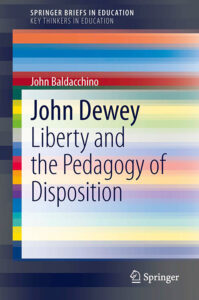
John Dewey: Liberty and the Pedagogy of Disposition
This book presents John Dewey’s work as a claim to the human potentials found in experience, the imagination and the possibilities that emerge from our disposition towards liberty. It details Dewey’s work as a critical junction marked by the quandary of schooling and culture, and where learning is also positioned beyond the boundaries of educational institutions. The book first examines Dewey in his various contexts, influences and life experiences, including his relationship with Hegelian philosophy, Emersonian transcendentalism, Darwin’s method of scientific experimentation, and his deep bond with his first wife Alice Chipman and their work in the Laboratory School. It then revisits Dewey’s approach to politics and education within contemporary debates on education, learning and the School. This discussion takes stock of what does a diverse and plural society mean to us today, at a time that remains challenged by the politics of class, race, gender and sexuality. Dewey’s work has a profound bearing on our understanding of these challenges. Thus to read and talk Dewey is to engage with a conversation with Dewey the philosopher who poses an array of questions, ranging from the way we feel (aesthetics), behave (ethics), think (logic), live as a community (politics) and how we learn (education). In addition, the book also takes Dewey’s concept of experimentation into a discussion of unlearning and deschooling through the arts and aesthetics education. Offering a thought-provoking dialogue with Dewey’s philosophy, this book recognizes the contradictory nature of learning and extends it to the open horizons of experience. By way of discussing the various aspects of Dewey’s approach to organization, policy making and the relationship between education and business, it repositions Dewey in contemporary political and educational contexts, exploring the possibility for education to be free and yet rigorous enough to help us engage with forms of knowledge by which we negotiate and understand the world.
“This short text provides a highly engaging and beautifully written reassessment of Dewey’s work, locating it in the wider intellectual and philosophical discussions about education, politics and life. Without being apologetic, John Baldacchino gives a sympathetic reading that shows the ways in which Dewey’s work still raises important questions for education today. A refreshing contribution to Dewey scholarship.”
Gert Biesta, University of Luxembourg
“John Baldacchino has presented an original engagement on John Dewey’s much written about work in this short and economically written book. The freshness of the novel perspectives he creates on the political and educational writings of the great pragmatist philosopher provide challenging and, often, instructive, reading.”
Kenneth Wain, University of Malta
Published by Springer, 2014.
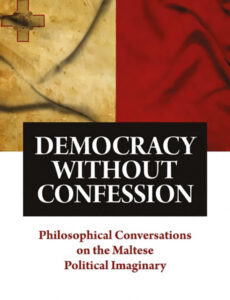
Democracy Without Confession: Philosophical Conversations on the Maltese Political Imaginary
These conversations are an implicit critique of those paternalistic forms of political discourse and action that regard citizens as passive recipients who would invariably concur with the Party, Church or the Establishment. The conversations clearly express a certain amount of anxiety over the fact that not unlike other societies, Maltese society has become trapped in the limitations of performativity and expertise, where democracy is slowly being eroded by new forms of power that appear to move beyond raditionalist hegemonic matrices while retaining even higher degrees of authority.
In these conversations, authors John Baldacchino and Kenneth Wain engage with philosophical traditions that provide a pluralistic logical horizon—what William James calls “a federal republic”—that reaffirms their critique and rejection of foundationalist, confessionalist and didactic discourses.
Both authors hope to open a discussion that starts from the Maltese political context but which then moves into a wider treatment of matters related to how the making of a civil society in times of constant change must highlight the urgent need to reassess the state and condition of democracy.
Written with Kenneth Wain. Published by Allied, 2013.
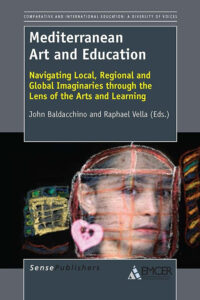
Mediterranean Art and Education: Navigating Local, Regional and Global Imaginaries Through the Lens of the Arts and Learning
Can we speak of a Mediterranean pedagogy of the arts? The authors in this volume argue in different ways that the answer to this question cannot be carved out of a singular, monolithic interpretation of the region. Instead, we need to look for provisional answers in the region’s dynamic developments, historic and contemporary exchanges of ideas and cultural codes and in the shifting nature of a sea that invites journeying, inquisitive people to discover new routes.
Edited with Raphael Vella. Published by Brill, 2013.
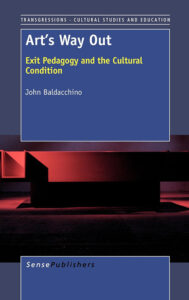
Art's Way Out: Exit Pedagogy and the Cultural Condition
In taking the critique of inclusion and entry as a first step, Art’s Way Out’s discussion of art, politics and learning aims to delineate what an exit pedagogy would look like: where culture is neither seen as a benign form of inclusion nor as a hegemonic veil by which we are all subscribed to the system via popularized forms of artistic and cultural immediacy. An exit pedagogy―as prefigured in what could be called art’s way out through the implements of negative recognition qua impasse―would not only avoid the all too facile symmetrical dualism between conservative and progressive, liberal and critical pedagogies, but also seek the continuous referral of such symmetries by setting them aside and look for a way out of the confined edifices of education and culture per se. An exit pedagogy seeks its way out by reasserting representation in the comedic, the jocular, and more effectively in the arts’ power of pausing, as that most effective way by which aesthetics comes to effect in its autonomist and radical essence. In this fluent, limpid, and scholarly work, Baldacchino examines, inter alia, the problem of empathy in relation to art as an event (or series of events), drawing upon a wide and rich range of sources to inform what in effect is his manifesto.
“In this fluent, limpid, and scholarly work, Baldacchino examines, inter alia, the problem of empathy in relation to art as an event (or series of events), drawing upon a wide and rich range of sources to inform what in effect is his manifesto. With a profound understanding of its philosophical basis, Baldacchino unfolds his argument in an internally consistent and elegantly structured way. This is not a book to be ‘dipped into’, to do so would miss the development of Baldacchino’s philosophical position; like an art work itself, Art’s Way Out has coherent structure, and a complex, interrelation between form and content, reflecting an artist’s concern for getting things right.”
Richard Hickman, Cambridge University
“Although art has a limitless capacity to take on myriad responsibilities, according to Baldacchino we also need to consider a ‘way out’ because only then will we understand how art goes beyond the “boundaries of possibility.” As he explains, “our way into reason also comes from an ability to move outside the limits that reasons sets”. This is the ‘exit pedagogy’ that he advocates. And here exit does not mean to leave, but rather to reach beyond, to extend and explore outside the borders we impose on learning, teaching, schooling and most forms of cultural agency. The need to embrace the capacity of art to cycle beyond the contingencies we impose on it also helps to clarify the limits of inclusive arguments for deploying art education for various individual, institutional, and socio-political ends: art as self expression, art as interdisciplinary method, art as culture industry, art as political culture, art as social justice and so on. This image invokes for me part of the legacy of Maxine Greene that Baldacchino revealed in his earlier text, Education Beyond Education (2009), when he explored her thesis of the social imagination, which is best, achieved when teaching becomes ‘reaching.’ What Art’s Way Out gives us is an exit strategy from the deadening tendency to ignore the enduring capacity of art to give life to learning, teaching and the very culture of our being.”
Graeme Sullivan, Penn State University
“This review can’t begin to describe the lengths that Baldacchino goes to in order to substantiate his arguments and explain the multitude of examples he presents in support of a solid (albeit transient) philosophy of art and education. Educators and artists alike will find many critical points to grapple with over their individual place in the arts. But whether you agree with his notion of groundlessness for art and aesthetics, or you spar with it for a more rationalized clarity of the subject, you will likely find yourself captivated by the possibilities of exits from this salient pedagogical maze.”
James Werner, Southern Polytechnic State University (Review in Visual Inquiry: Learning and Teaching Art. 1[3].)
Published by Sense, 2012.
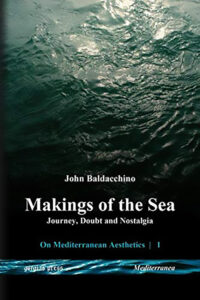
Makings of the Sea: Journey, Doubt and Nostalgia
Makings of the Sea is an inquiry into the makings of the Mediterranean imagination in the 20th century, focusing on specific cases in the visual and performing arts, music and literature. It also questions a number of populist perceptions of the Mediterranean and its cultures. Following a thematic structure that falls broadly under the headings of journey, doubt and nostalgia, this is an essay on Mediterranean aesthetics.
“The first book of a trilogy that explores Mediterranean aesthetics, Maltese born author, John Baldacchino begins his ‘Odyssey’ with as much richness, complexity and depth as the expansiveness and sublimity of Theo Angelopoulo’s film Ulysses’s Gaze. He turns to the Sea to begin weaving the geopolitical specificity of the Mediterranean imagination. In a series of poetic chapters, Baldacchino deftly charts a journey that willingly faces doubt as to the vistas he presents, but always returns home so that he can begin anew. Baldacchino starts his quest by tracing a horizon against which a host of artists, poets, and writers are drawn upon, all the while keeping the significance of the Sea at play as he takes the reader to home shores so that the second volume can begin to appear on a new horizon. The book is an important achievement in Mediterranean geopolitical aesthetics. We await its sequels.”
jan jagodzinski, University of Alberta
“A fascinating and related aspect of Baldacchino’s book is gradually recognised as the reader progresses through the text and realises that the book is itself an embodiment of this epic journey, carrying him or her from one land to another, connecting one discipline to several others, and leaping into the sea during different decades of the twentieth century. As he or she traverses a complex interdisciplinary series of fields, the reader will find that this journey is not an easy one, but then again, a smoother reading would probably serve only to undermine the idea of a horizon that is replete with uncertainties.
The hybridity, richness, and indeed, the doubts that permeate any serious engagement with the Mediterranean are not only palpable in the author’s scholarly insights and in the complex moves that the book performs, but especially in the fact that this book is actually only the first of a trilogy of texts on Mediterranean aesthetics that Baldacchino is working on.” Raphael Vella, University of Malta
Published by Gorgias, 2010.
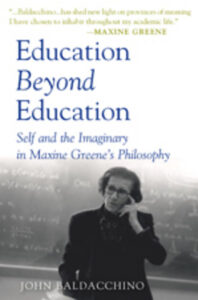
Education Beyond Education: Self and the Imaginary in Maxine Greene's philosophy
Developing a theme in dialogue with Maxine Greene’s philosophy, this book introduces the reader to what animates Greene’s passionate work: the self and the imaginary. It illuminates how Greene empowers us all as learners of the possible, by identifying learning with the power of the imagination. Greene’s work promises hope beyond the impasse that often occurs when learning is reified by educational systems. Education Beyond Education illustrates how Greene redefines the notion of the imaginary – and with it, that of the imagination – as that which expands the possibilities of learning beyond the boundaries by which education is often narrowly defined and practiced. Tracing Greene’s key arguments, Education Beyond Education offers a strikingly original and empowering way to see and re-position education beyond its customary limits.
“As the ‘subject’ of this text, I wish to testify to its fairness and, yes, to its thoughtfulness. Because of John Baldacchino’s scholarly acquaintance with traditions that might infuse and clarify the complexities of education, I think he has shed new light on provinces of meaning I have chosen to inhabit throughout my academic life.”
Maxine Greene
“There are at least two reasons why John Baldacchino is superbly equipped to offer this interpretive perspective of Maxine Greene’s philosophy. First, like Maxine, herself Baldacchino is well read in the continental philosophies of the Frankfurt School including such writers as Theodor Adorno and Max Horkhiemer. He is well versed in the existential philosophies of Albert Camus , Jean Paul Sartre and Maurice Merleau-Ponty, all writers of central importance in Greene’s thought as well. Had this appraisal been prepared by a North American, say an adherent of one of the analytic philosophies, it is doubtful that a critical reading of Greene would have occurred, let alone a sympathetic one. Second, unlike the tight linearity of the analytical school Baldacchino’s own writing might best be described as having a painterly quality. His logic unfolds like that of a web, with multiple connections so that a discussion of oppositions such as theory vs practice , past vs present, or truth vs falsehood does not lead the reader to a single conclusion but to an ever widening inter-connected web — to an array of meanings, in much the same way that Greene makes connections between works of art as possible worlds in the imagination.”
Arthur Efland, Ohio State University
“Reading philosophy in any meaningful way is never easy; reading commentary of philosophy is often even more difficult, but John Baldacchino skilfully renders Maxine Greene’s work accessible and opens up avenues of ideas that are worthwhile and relevant, such as the central notion that educators should look at education from a perspective beyond the classroom.”
Richard Hickman, Cambridge University
“Baldacchino richly engages Greene’s prose. In a particularly successful way he enacts his methodology of trying to dialogue with her work rather than to ventriloquate her voice through his own. The book features a great deal of Greene’s language, showing her thinking out loud, so to speak, about educational questions, questions of meaning and purpose, political and aesthetic concerns, and a good deal more. I think any serious reader of Greene’s work will find Baldacchino’s interpretation of her overall oeuvre, pivoting around the diptych of self and the imaginary, to be enlightening and educative. His sustained dialogue with her encourages the reader to return to Greene’s texts and to look again both at their core claims and at the form in which they are expressed. Any serious reader new to Greene’s work will find Baldacchino’s book a helpful guide and resource – a good companion, so to speak.”
David T Hansen, Teachers College, Columbia University
“Baldacchino makes a couple of choices that prove brilliant in the end. First, in the spirit of Maxine Greene, he chooses to write, in effect, in dialogue with Maxine. He is seeing alongside her, reacting, reflecting, and choosing. This becomes, then, an invitation to readers to do their own seeing, to do philosophy themselves, to enter and contribute their own reflective praxis. (…) Second, Baldacchino focuses on the deeper connections in Greene’s work around the self and the imaginary. He illuminates what he sees as the central and profoundly readical idea of freedom–pushing against the impasses and the imposed horizons we encounter in the everyday landscapes of our lived lives, and becoming students, then, of the possible through the imagined, the imaginary.”
William Ayers, The University of Illinois, Chicago.
“In Education Beyond Education, John Baldacchino examines the paradigm of education and learning that Maxine Greene offers us. It is a much needed work and a valuable contribution to philosophy of education. Professor Baldacchino presents the intricacy and depth that Maxine Greene has to offer, challenging the reader to delve into the complexity that Maxine Greene has written about. Anyone looking for an introduction to the works of Maxine Greene will profit from this insightful book.”
Anthony DeFalco, Long Island University
Published by Peter Lang, 2008.
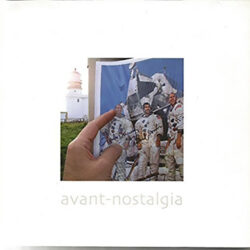
Avant-Nostalgia
With Jeremy Diggle. Published by Robert Gordon University, 2002.
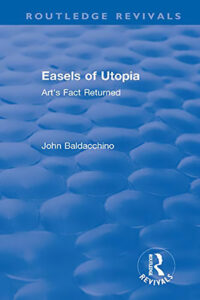
Easels of Utopia: Art's Fact Retuned
Easels of Utopia presents a discussion of art’s duration and contingency within the avant garde’s aesthetic parameters, which throughout this century have constructed, influenced, and informed our definitions of modernity. In this context the book reads Umberto Boccioni’s Futurism as reminiscent of Thomist realism; proposes Caravaggism’s historical relevance to the election of individuality in post-war realism; and draws the readers attention to the aesthetic implications in Carlo Carrà’s metaphysical art and its reappraisal of the early Renaissance. Following a contextual analysis of the historic avant-garde in Part One, Part Two presents parallel discussions of Italian and British questions, articulated by the works of Marino Marini, Francis Bacon, Renato Guttuso and Stanley Spencer in their return to individuality within art’s aesthetic construct. The author argues that this initiates a return to ‘lost’ beginnings where form seeks knowledge, content regains an ability to anarchize, and art recognizes its contingent condition.
Published by Ashgate 1998; Routledge 2018.
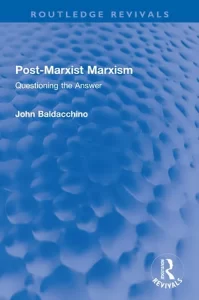
Post-Marxist Marxism: Questioning the Answer: Difference and Realism after Lukacs and Adorno
Post-Marxist Marxism is a discussion of realism in a Post-Marxist context. The book argues that this discussion must take two simultaneous routes: recognizing deconstruction as the tool of enquiry to disentangle the insufficiency of contemporary answers in political philosophy and aesthetics, and reclaiming realism to move beyond the Post-Modernist tradition. To answer the issues of realism, the book revisits Lucacs’ and Adorno’s aesthetic questions, which in their different approaches prefigured the questions of the present. Central issues include totality; method; identarian and non-identarian dialects; the Enlightenment; and the end of Modernity.
Published by Avesbury 1996; Routledge, 2018.
Published
Baldacchino, J. & Saeverot, H. (eds.) (2024). The Bloomsbury Handbook of Continental Philosophy of Education. London: Bloomsbury.
Baldacchino, J. (2023). Lessons of Belonging: Art, Place and the Sea. Leiden: Brill.
Baldacchino, J. (2020). Educing Ivan Illich: Reform, Contingency and Disestablishment. New York: Peter Lang.
Baldacchino, J. (2020). Sejjieh il-Hsieb. Limitu u Helsien [Rubbleworks of Thought: Limit and Freedom]. Santa Venera: Klabb Kotba Maltin/Midsea Books.
Baldacchino, J. (ed). (2019). The International Encyclopedia of Art & Design Education. Volume 1: Philosophy and History of Art Education. Hoboken: Wiley.
Baldacchino, J. (2018). Art as unlearning: Towards a mannerist pedagogy. London/New York: Routledge.
Baldacchino, J. (Series editor) (2016). Doing Arts Thinking: Arts Practice, Research and Education. Leiden: Brill.
Baldacchino, J. Galea, S. Mercieca, D. (eds.) (2014). My Teaching, My Philosophy. Kenneth Wain: A Lifelong Engagement with Education. New York: Peter Lang.
Baldacchino, J. (2014). John Dewey: Liberty and the Pedagogy of Disposition. Berlin: Springer Publishers.
Baldacchino, J. & Wain, K. (2013). Democracy without confession: Philosophical Conversations on the Maltese Political Imaginary. Valletta: Allied Publishers.
Baldacchino, J. & Vella, R. (eds.) (2013). Mediterranean Art and Education: Navigating local, regional and global imaginaries through the lens of the arts and learning. Special Edition of the Mediterranean Journal of Education Studies. Rotterdam: Sense Publishers.
Baldacchino, J. (2012). Art’s Way Out: Exit Pedagogy and the Cultural Condition. Rotterdam: Sense Publishers.
Baldacchino, J. (2010). Makings of the Sea: Journey, Doubt and Nostalgia | On Mediterranean Aesthetics. Volume 1. Piscataway: Gorgias Press.
Baldacchino, J. (2009). Education Beyond Education: Self and the imaginary in Maxine Greene’s philosophy. New York: Peter Lang.
Baldacchino, J. (2002). Avant-Nostalgia: An excuse to pause. Images by Jeremy Diggle. Unit for the Study of Philosophy in Art (USOPIA) Series, published under the auspices of the European League for the Institutes of the Arts (ELIA). Robert Gordon University: Aberdeen.
Baldacchino, J. (1998). Easels of Utopia: Art’s Fact Returned. Aldershot: Ashgate.
Baldacchino, J. (1996). Post-Marxist Marxism: Questioning the Answer: Difference and Realism after Lukacs and Adorno. Aldershot: Avebury.
Re-published (New editions)
Baldacchino, J. (2018). Easels of Utopia: Art’s Fact Returned. London/New York: Routledge.
Baldacchino, J. (2018). Post-Marxist Marxism: Questioning the Answer: Difference and Realism after Lukacs and Adorno. London/New York: Routledge.
Forthcoming
Baldacchino, J. (2024). Secular Reflections. On a nation’s anomaly (Midsea)
Saeverot, H., Baldacchino, J., Biesta, G. (2025). Indirect Education: A guide for educators (Bloomsbury)
Baldacchino, J. (2025). Hope in groundlessness. Art’s Gaming Lost. (Brill)
Baldacchino, J. (2025/26). Giambattista Vico: Making before Learning. (Springer).
Baldacchino, J. (2025/26). Relative Ignorance: Education in an age of lying (completed, seeking publisher)
Baldacchino, J. (2026/27). Art’s Isness: Immanence and Reality (in progress, seeking publisher)
